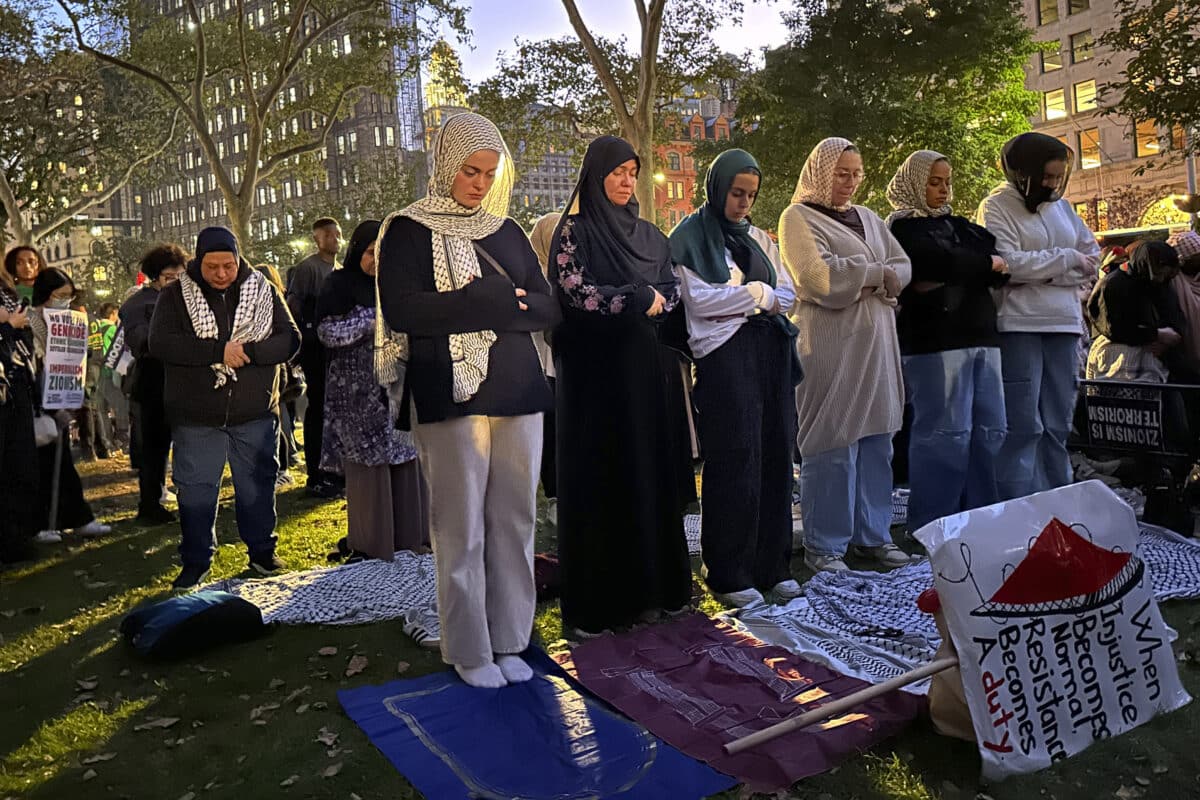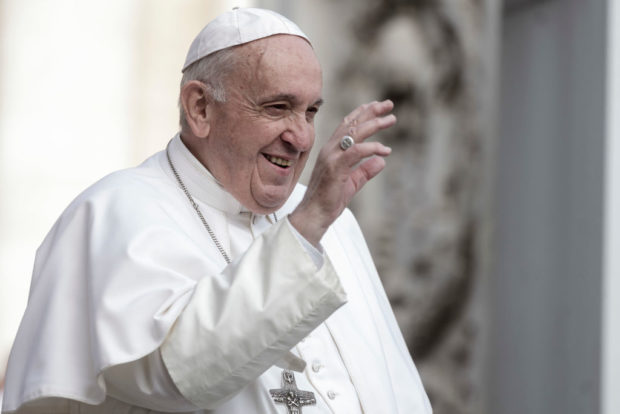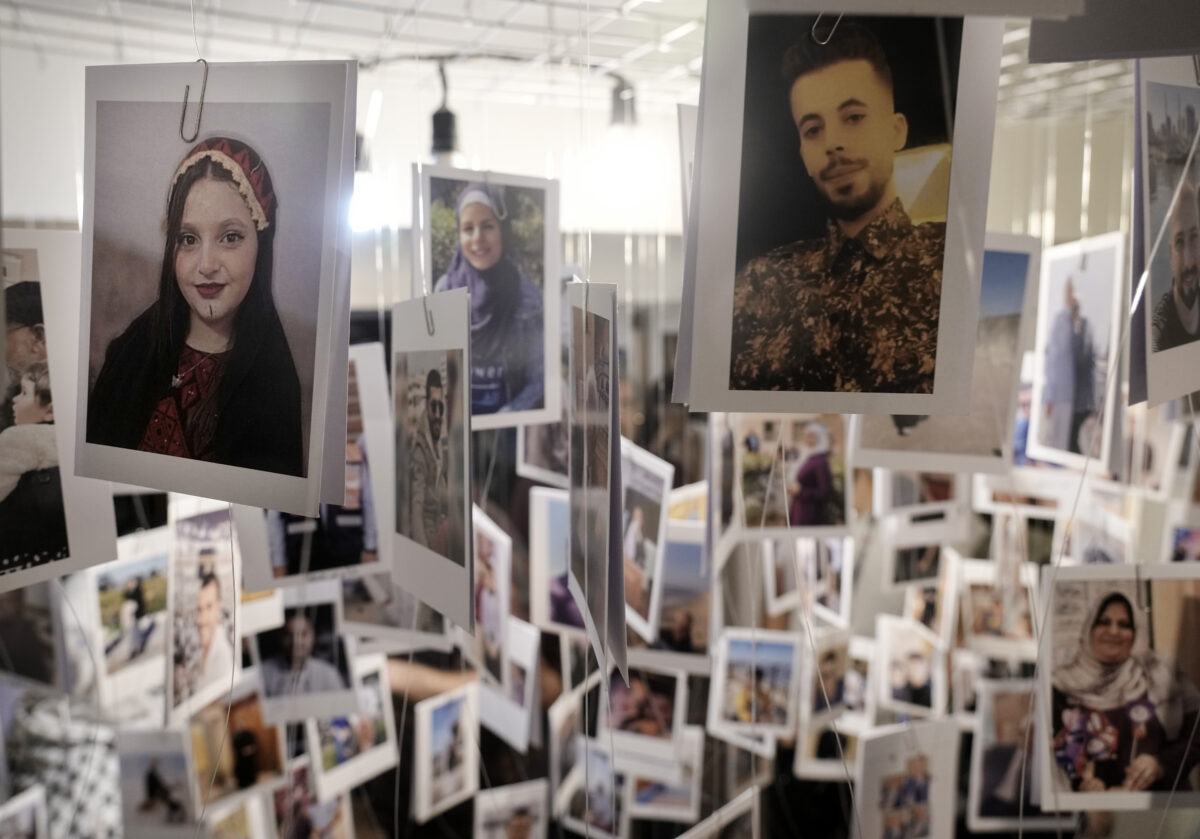Pope Paul VI: ‘If you want peace, work for justice’

A blocks-long column of pro-Palestinian protesters marches through Manhattan streets and parks in New York on Monday, October 7, 2024. Commemorations and protests are being held across the world to mark a year since the Oct. 7 Hamas attack on Israel. The militants’ assault a year ago sparked a war that has devastated the Hamas-ruled Gaza strip, while fueling bloodshed in other Mideast lands and stirring protests and divisions far away. (AP Photo/Ted Shaffrey)
Pope Francis assigned Oct. 7, 2024, as the “Day of Prayer and Fasting for Peace,” with an exhortation for the end of war in the Middle East.
He urged us to reflect deeply on the profound connection between justice and peace based on what the Old Testament prophet declares, “The fruit of justice is peace” (Isaiah 32:17).

Pope Francis/FILE PHOTO
Given this, let us recall what Pope St. Paul VI said in his World Day of Peace message on Jan. 1, 1972. “If you want peace,” emphasized the holy Italian pontiff, “work for justice.”
In this context, it is good to center our prayers and sacrifice of fasting on achieving “just peace,” considering that the highlight of the Israeli-Palestinian story of deadly conflicts is the urgent need for peace built on justice.
The question that nags is this: Is there injustice in the present war in the Middle East?
Briefly, let us go back to Oct. 7, 2023, the day the world witnessed the loss of 1,200 Israelis and foreigners in an attack by Hamas. The aphorism “an eye for an eye” appears to be the overwhelming response as the mighty force of the Israeli military seeks vengeance. For one solid year, the Jewish nation retaliated with the aim of destroying all Israel’s enemies.
To date, reports indicate that 42,600 Palestinians in Gaza lost their lives resulting from Israeli military actions, which many say border injustice.

Pictures of Palestinian victims who were killed during the Israel war against Hamas, are displayed during a photo exhibition, (Gaza Habibti), Gaza my love, to commemorate the one-year anniversary of the war in the Gaza Strip, in Cairo, Egypt, Monday, Oct. 7, 2024. (AP Photo/Amr Nabil)
In this situation, the quest for peace cannot be divorced from the quest for justice; they are intrinsically linked.
It is good to understand what is just and what is unjust in this conflict. To understand the line that divides them, it is essential to dig deeper and grasp the historical roots of this conflict.
It appears that those who may obscure the truth or may justify that what is being done by Israel to her enemies is just and fair, often describe the situation in the Middle East as complicated, or intricately problematic.
We can actually read history in a straightforward way using a simple parable, quite reminiscent of Jesus’ style or method of teaching. In this way, we may be able to confront the difficult truth of justice, or lack of it, in the present conflict in a more approachable way.
The parable is told by the Israeli Jewish historian and social activist Ilan Pappé, now based in England. Though an Israeli, he is against the destruction and expulsion of the Palestinians in Israel.
His parable goes like this: A homeowner was peacefully asleep when a home invader broke in and claimed that the house was his, as this was owned by and where his ancestors lived for 2,000 years. The home invader showed as his proof the purported 2,000-year-old deed of title to the house and then forcibly removed the homeowner out of the house.
When the homeowner called the police for help, the police ordered both parties to work it out between them and partition the house instead of resolving the dispute.
In this allegory, it is said the “homeowner” represents the indigenous Palestinians who have been displaced and dispossessed, while the “home invader” symbolizes the waves of Jewish immigrants from Eastern Europe (mainly Russia, Ukraine and Poland) who began arriving in the 1880s and eventually established the modern state of Israel in 1948.
The “deed of title” in this scenario is the Bible, which has been used, abused or misused to justify Zionist claims to the land. It is crucial to clarify that there is no continuity, equivalence and identity between Biblical Israel and the Zionist modern state of Israel, Pappé thought. He added that the Bible’s land promises and prophecies of return were all fulfilled in biblical antiquity and do not pertain to the modern Zionist project.
The Catholic Church teaches that the present iteration of Biblical Israel is the Church, the New Testament being the continuation of the Old Testament and the ancient People of God is today’s Christians, the People of God (CCC 877, Lumen Gentium 9, Ad Gentes 5; based on Romans 2:28-29, Galatians 3:28-29, 1 Peter 2:9, inter alia).
The “police” in this narrative represents the international agencies and powerful nations that have often sidestepped their responsibility in resolving the conflict.
Their failure to mediate effectively has left the displaced homeowner in a continuous struggle to reclaim what is rightfully his.
The war in the Middle East tramples human dignity and produces defenseless victims too many to count. As we heed the call of Pope Francis to pray and fast, we can only recognize that our prayers and sacrifice of fasting for peace encompass a fervent plea for justice.
By “just peace,” Christians understand not merely an absence of conflict but a harmonious existence rooted in fairness, accountability and respect for human dignity and property rights.
It is a Christian calling to pray and fast for peace, while at the same time addressing what is unjust and unfair.
We Christians can advocate for a just and fair resolution to the Israeli-Palestinian conflict. May our collective prayers, sacrifice of fasting and actions foster a deeper understanding and a commitment to justice, paving the way for a future where peace on Earth and goodwill to all humankind can genuinely flourish.
Thaddeus Noel G. Laput is a Catholic philosopher and a hospice chaplain in Los Angeles, California. José Mario Bautista Maximiano is the author of the 3-volume work on Church Reforms (Claretian, 2023, 2024, 2025) and the author of the 3-volume work on 500 Years of Christianity in the Philippines (Claretian, 2021, 2022).

